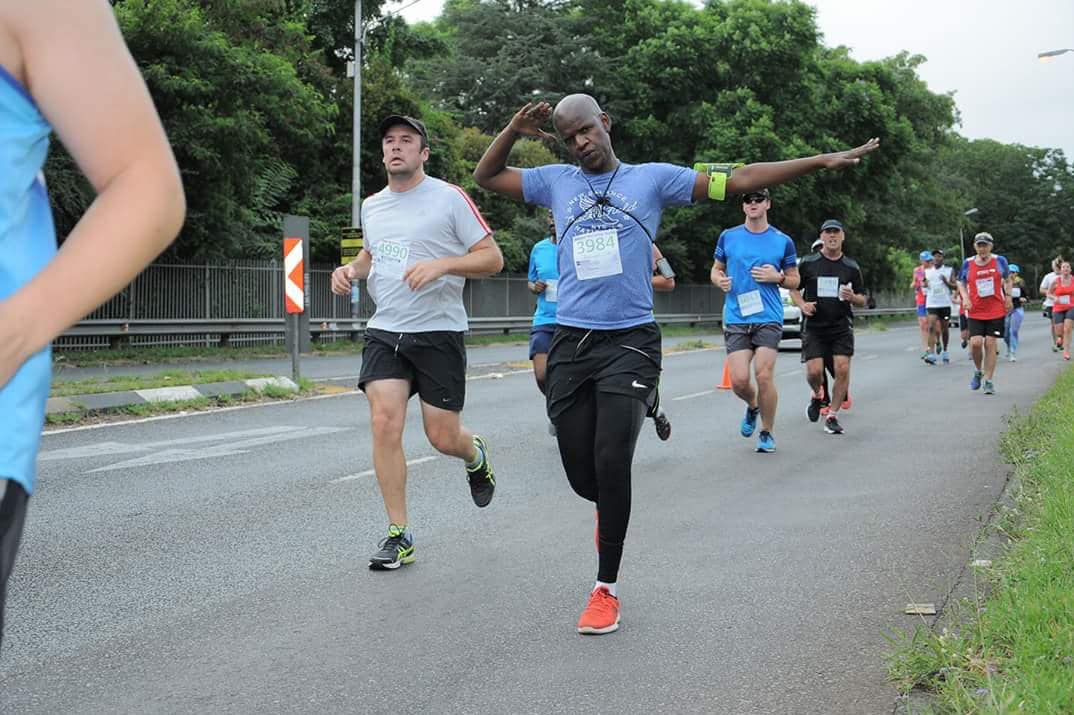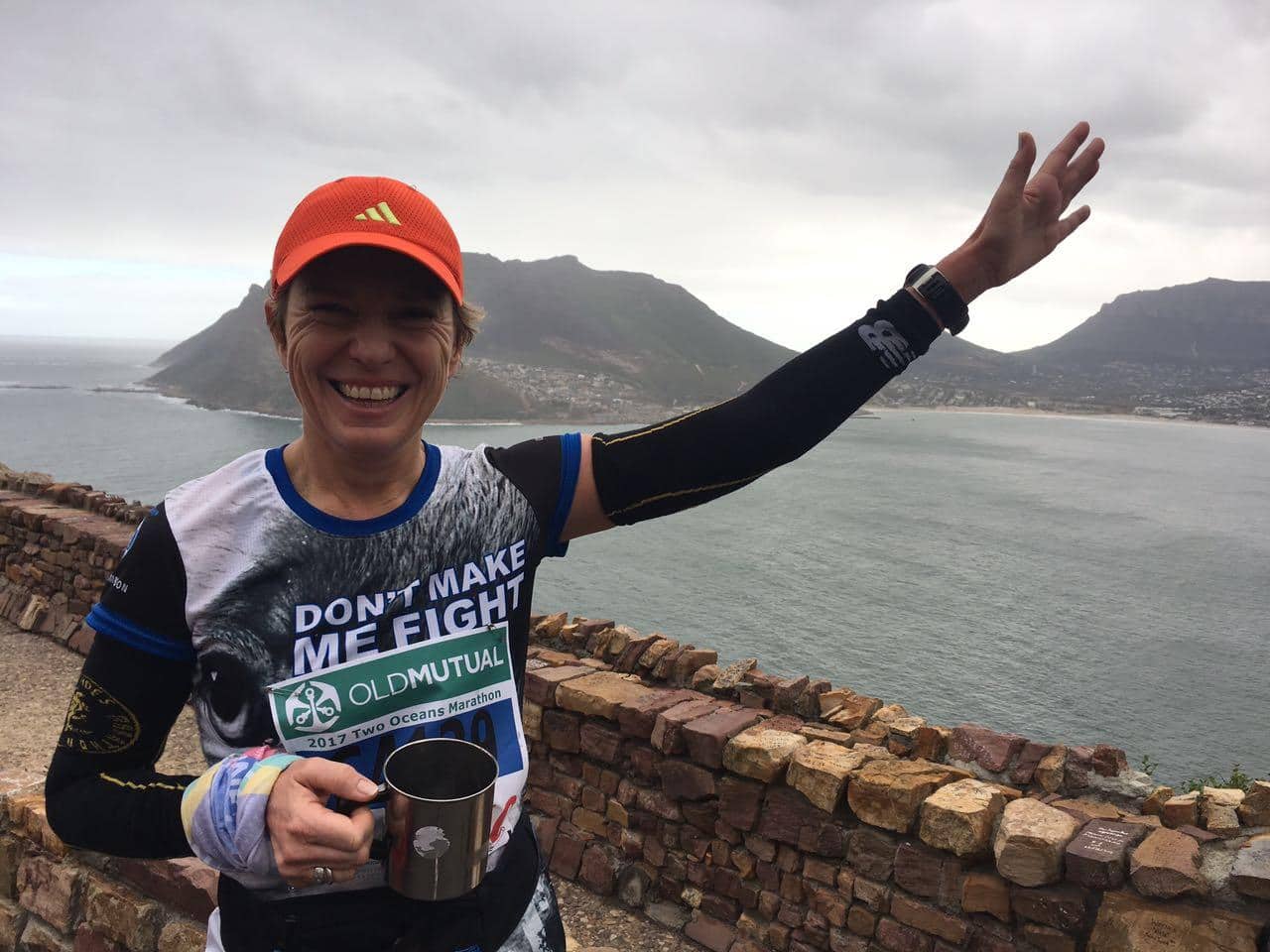How Do You Run When Your City’s Almost Out Of Water?
For the runners of Cape Town, getting in their daily-kilometres means hunting down natural springs, foregoing showers, and reflecting on a looming environmental disaster.
Last week, Katy Perry announced she’d be performing for the first time ever in South Africa this July. The response from one fan best captured the mood of a country with its major tourist hub in the throes of a never-seen-before crisis: “Tell her to bring water as well.”
The BEST reaction to her coming to South Africa ?
— Brent Lindeque (@BrentLindeque) January 24, 2018
These sardonic cries for help turned out to be for naught. The singer won’t be Swish Swish-ing her way to drought-stricken Cape Town – usually a standard stop for touring artists. But while the promoters have declined to acknowledge if Cape Town’s water crisis is to blame (they cited only “production logistics”), the rest of the world has been watching as South Africa’s oldest city edges closer to its “Day Zero.”
That ominous term signifies the date predicted by officials when the city’s dam levels will drop to below 13.5 percent, too low to deliver a drinkable supply to residents. It was originally said to be April 22; then it was alarmingly brought forward to April 16 (confirmed on Tuesday, 30 January). Regardless of which mid-to-late-April day it lands on, Cape Town – home to 4 million and holiday spot to 2 million more per year – will become the first major city in the world to run out of water. It’s a crisis brought on by three years of constant drought conditions, coupled with a population boom in a city beloved for its sandy beaches, picturesque wine-lands and vibrant tourism industry.
RELATED: 5 Ways To Stay Hydrated During Long Runs
That this day was coming wasn’t exactly a surprise, but what was once spoken of only in whispers has now become a panicked shout. Angry residents blame the government for only exploring and building alternative water supplies now, but politicians point fingers right back at their constituents, saying residents haven’t adequately heeded calls to conserve water. It’s a problem that picks at the country’s history of segregation: Its poorest areas have never had running water, but only now that the issue has reached the more affluent parts of the province, affecting everyone across the socio-economic board, it’s become a priority for policymakers.
And it’s an issue that the city’s runners, who consume and use more water than the average non-active citizen, are now forced to reckon with: Is it worth continuing to run under such conditions, and if so, how do you do it?
Two Oceans, Not a Drop to Drink
Just two weeks before the anticipated Day Zero, 27,000 people are set to take part in the 49th edition of the Old Mutual Two Oceans Marathon, in either its half or ultra marathon distances. With its gorgeous mountain-to-beach route, it’s not hard to see why organisers have proclaimed it the world’s most beautiful race. Management accountant Letlamathebe Amos Baepi is one of those runners who fell in love with the scenic route after he ran the race last year, and had signed up to run it again this year. ‘I’m gutted about not participating this year,’ he says. ‘Cape Town is really the most beautiful marathon in the world, and running it gives me goosebumps.’

A runner since 2009, Baepi made the decision to voluntarily give-up his entry because of the water crisis. “I cannot run comfortably if I’m not hydrated,” he says. He’s used to drinking water every 6km-8km during a marathon, and is worried there won’t be enough available to him.
The organisers have said the Two Oceans Marathon, and all the activities slated to take place around it, will still go head. They’re working with the City of Cape Town and its disaster management team to figure it all out. So far, no municipal water will be used for any of the events; there will be no showers and the number of aid stations will be reduced. They say they understand Capetonians are worried, especially because half of the entry field is from outside of the metropolitan area, but the economic benefit these visiting runners bring must be noted too – projected to be over 675 million rand spent, together with thousands of jobs created, plus over 3 million rand raised for charity.
Still, there have been calls for Two Oceans to be cancelled or moved to a later date, as some residents question where the water for visitors from outside the city will come from.
RELATED: Hydration Cups For The Win!
How Much Water Does One Runner Need?
When the crisis first became too pressing to ignore, the City of Cape Town suggested residents use only 50 litres of water per person per day. On February 1 that becomes mandated, and enforced by financial penalties. But on Day Zero that figure will be reduced to 25 litres. Some runners have gotten used to bringing and carrying their own water to races, allocating it from their daily ration – like Beverly Houston, a publicist living in Observatory, who regularly takes part in the Two Oceans half marathon and trail race.
‘I use a hydration pack – for road races and for trail ones,’ Houston says. ‘I did a race last Sunday and they didn’t provide water stations. They let people know beforehand, and no-one seemed to have a problem with this.’

Her go-to approach has been to use purified water, and any leftover goes straight onto her plants or into the grey-water system she’s had installed in her house. ‘Everyone needs to be playing their part,’ she says. Like Houston, pro trail runner Brendan Lombard, who runs six days a week, sometimes twice a day, makes use of a hydration pack. Lombard, who’ll be running the South African Ultra Trail Championships in March at the ADDO Elephant Park, says the water crisis hasn’t really affected his running because he is able to afford to buy five-litre spring water canisters from local supermarkets.
RELATED: Hydration Packs vs Vests for Trail Runners
‘I don’t feel guilty drinking water while running as I am not depleting our main feeding dam. My water is purchased from spring water companies from up-country. I do, however, feel terrible for those which cannot afford to be purchasing water every day,’ he says. ‘South Africa’s poor are going to be hit hardest by this crisis’
Lombard also drinks from natural springs found on runs he does up in the mountains. Philippa Jephson, who runs Run Cape Town tour company says they’ve been getting their water from mountain springs, too. But she’s not sure how much longer that will viable with even those sources drying up. ‘I tend to try not to overreact and try to take things a day at a time,’ she says. ‘But it is dire. If we hit Day Zero with no water, we won’t be able to host all those visitors without running water.’
Jephson says she’s surprised that visitors only seem to become aware of the water crisis once they arrive in Cape Town. ‘I have had no queries with regards to our water concerns prior to our running guests arriving, which I know seems bizarre!’ she adds. ‘It has affected our tours in that on a few of the routes where we used to stop for potable water the taps have actually been removed so they no longer provide water for the public.’
A spring near Newlands Forest has become an increasingly busier spot. Sue Ullyett, a long-time runner and race event manager, runs near there twice a week. ‘We used to go there just after 5 a.m. and fill up a few containers that would last us for a few weeks. Now it’s so busy from 4 a.m. that it’s a challenge to get water from there. There are people everywhere, and I’ve heard it’s become quite nasty and heated among people who are exercising their right to get water.’
She’s worried about the days to come. ‘How the hell are we going to go queue for our 25 litres when there are going to be thousands more trying to do so, too?’ she wonders. It’s a question also troubling Alexis van Reenen, who runs with the amateur club Carbineers Western Province. ‘I am concerned about finding time to have to stand in a line to collect water where tens of thousands of people will be lining up – this after having to work a full day,’ she says. ‘The possibility of violence is incredible as we have heard of one stabbing this week at one of the natural springs.’
The New Normal
Beyond getting water to hydrate, post-run showers have now become a luxury, with runners getting adept at using wet wipes and timing their showers to be under a minute. ‘I jump in a cold shower – luckily, it’s summer for us – get wet, switch off, soak quickly, wash my hair, and then rinse. I’ll use that water for the toilet cistern afterwards,’ says Ullyett. ‘I miss having a nice bath after a long run; I haven’t had a bath in over two years, it just becomes something you don’t do anymore.’ Van Reenen says she knows women runners who’ve cut their hair as short as possible so that it’s easier to maintain and doesn’t require so much water when washing it.

‘As runners, we go through plenty clothing,’ says Lombard. ‘And washing our clothes once a week is unfortunately going to have to become a reality. No use of washing machines will be allowed and we will need to hand wash our clothes with very limited water.’
Despite the anger and fear, most runners remain optimistic and are learning to adjust. ‘This is not going to put me off running,’ says van Reenen. ‘I love it. I love being with nature. I love the atmosphere at the races – and the euphoria you feel when finishing a race. It also helps with stress release.’
Ullyett sees it as a cautionary tale for others – runners or not – in the rest of the world to heed. ‘We take it for granted that you turn the tap on and water comes out. So we use it, willy-nilly, thinking there is an endless supply.’ In the meantime, she’ll keep on running. ‘I never will not want to go run. Even if I have to jump into the [freezing Atlantic] sea to wash afterwards. I can’t not run. It’s how I cope. It’s not all doom and gloom. South Africans are resilient; we’ll get through this. We may end up being a little smellier,’ she chuckles. ‘But we’ll keep on at it.’
RELATED: 5 Body Odours You Should Never Ignore!
Even if the taps don’t run, it seems, Capetonians still will.
READ MORE ON: cape-town marathon two oceans 2018 western-province

